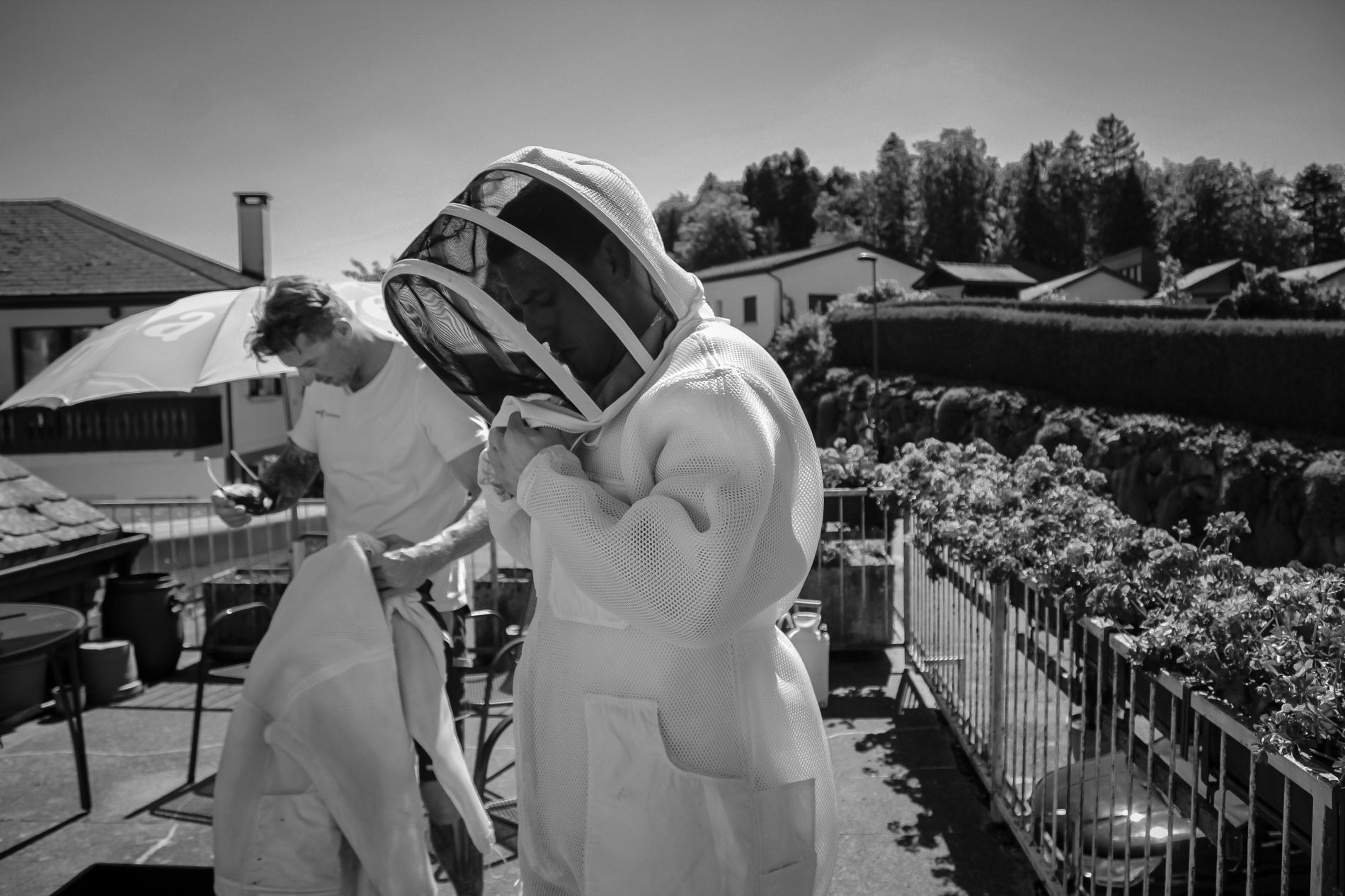
Fighting Asian hornets in Pully
Have you discovered an Asian hornet's nest? We'll be on site quickly! Call now - Daily Mon-Sun 07:00-21:30. Contact us now: 058 510 22 54
Having the Asian hornet's nest removed
Originating in South-East Asia, Vespa velutina, a hornet species, has rapidly invaded Switzerland as well as the entire subcontinent, causing beekeepers to sound the alarm. While harmless to humans, it has gained notoriety as a predator of honey bees. Just a few of these hornets can launch an attack and eliminate an entire bee colony within a few hours. If you have discovered a hornet's nest on your house, patio, shed, or in your blind box, contact our experts for hornet nest removal in Pully!
Use the uncomplicated telephone service of the Hornet experts in Pully and simply inform us at 058 510 22 54, we will be on site quickly so that you and everyone in your area feel completely safe again.
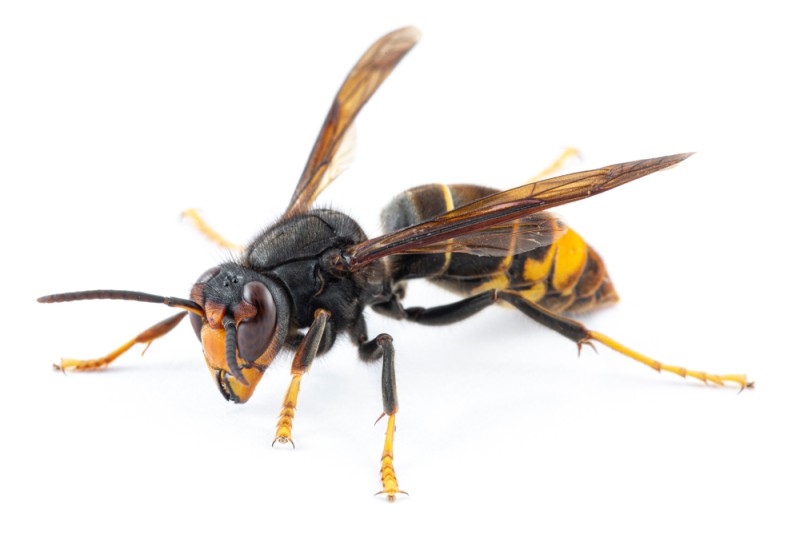

Appearance of the Asian hornet
Here are some characteristics that distinguish the Asian hornet:
1. Size: The queen can reach a length of about 3 cm, while the workers are slightly smaller and measure about 2.5 cm.
2. Color: The Asian hornet has a dark body that is almost black, with a yellow stripe at the back of the abdomen. Its face is orange-yellow.
3. Wings: The wings are dark and almost smoky gray.
4. Legs: The hornet has yellow tips on its legs, which is a striking distinguishing feature when it flies.
5. Nest: The Asian hornet's nest is often high in the trees, but it can also be found underground or in tall structures such as chimneys. It has an oval shape and is made of chewed wood, which gives the hornet a papery texture.
It is important to distinguish the Asian hornet from the European hornet (Vespa crabro), which is more harmless and a natural part of the European fauna. If you suspect you have found an Asian hornet nest near you in Pully, you should report this to the local authorities, or using our reporting form, as they can spread quickly and be harmful to bees and other insects. To avoid being attacked by the flying inhabitants, you should hire a professional pest controller such as the Hornet Experts Pully. We can identify the nest beyond doubt and take further steps to remove the Asian hornets professionally.
News about the Asian hornet in Pully
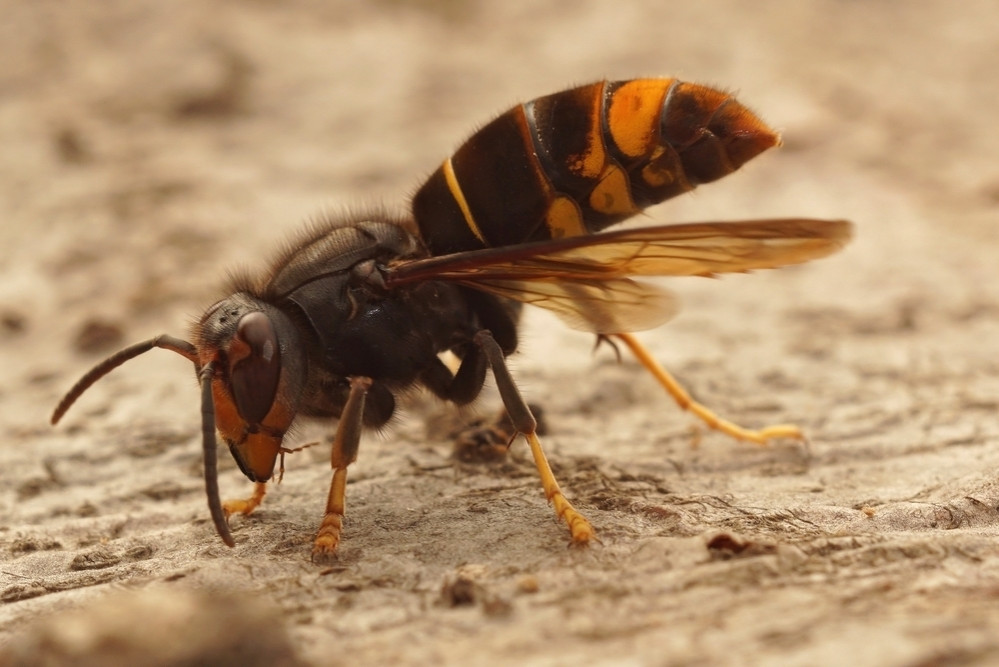
02.12.2025 Western Switzerland: Killer hornet eats bees
The territory of the Asian killer hornet has expanded considerably this year, with a notable increase reported in western Switzerland. This invasive species poses a significant threat to native bee populations, as bees make up the majority of its diet. The potential consequences are serious. Moreover, the hornet represents a danger to individuals with allergies to its venom.
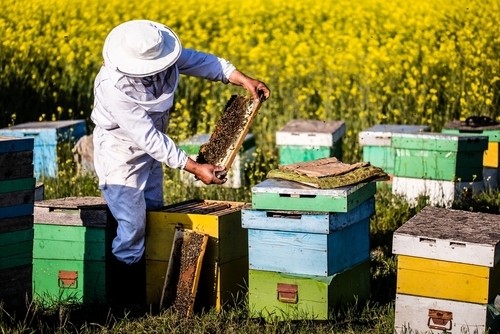
25.11.2025 Serious concerns about the bee population!
Asian hornets are inflicting significant harm on beehives across multiple parts of Europe, as reported by local beekeepers. Even a small number of hornets can destroy an entire bee colony within hours. This sharp decline in pollinators could have serious consequences for pollination, local ecosystems, and agricultural productivity.
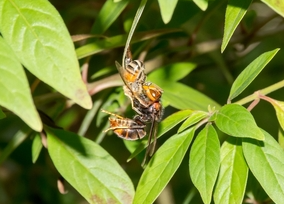
18.11.2025 Asian hornet doesn't just eat bees!
The danger it presents to insects is substantial!
The Asian hornet feeds largely on honeybees—up to 85 percent of its diet—alongside beetles and flies. This high level of predation not only poses difficulties for fruit growers but also further threatens already vulnerable bee populations.
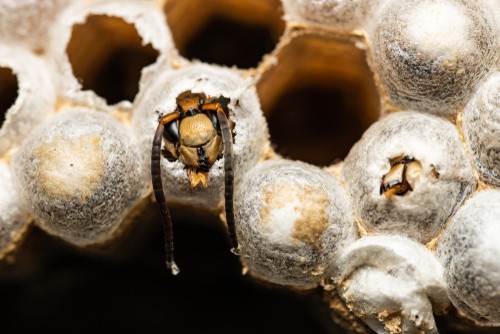
11.11.2025 How did the Asian hornet get to Europe?
The Asian hornet likely arrived in Europe unintentionally and has quickly expanded throughout France and nearby countries. Its adaptability to different environments and the absence of natural predators have contributed to its rapid spread. A single nest can generate several hundred new queens in one breeding season.
Asian Hornet Reporting Form
Please fill out all required fields and submit the form.
Help us!
If you discover an Asian hornet or a nest of this invasive species in Pully, it is of the utmost importance that you report it immediately. The Asian hornet is not only dangerous to humans, but also poses a serious threat to native bee populations and the ecological balance in Switzerland.
Why is it important to report the find?
Honey bees are among the native insects greatly affected by the presence of the Asian hornet in regions where it has established itself. By preying on bees, these hornets contribute to a decrease in pollinator populations, ultimately influencing the local flora and agricultural productivity. By reporting sightings, experts can react quickly, remove the hornets or their nests and thus prevent the spread of this invasive species.
Notification form for sightings
Help us prevent the overpopulation of Asian hornets in Switzerland and safeguard our native insect populations by reporting any suspicions or sightings via our dedicated reporting form. With your support, we can swiftly intervene and minimize the proliferation of this harmful species in our ecosystems.
Your contribution is crucial in the fight against the Asian hornet in Pully. Together we can protect nature and maintain the balance of our ecosystems;
Thank you for your vigilant attention and your commitment to protecting our environment.
How dangerous is the Asian hornet?
The Asian hornet (Vespa velutina) is a predatory insect that originated in Asia and has spread in recent years to various parts of Europe, including France and now also Switzerland and in Pully. Although it poses a threat to honey bees and native biodiversity, it is generally no more dangerous to humans than other wasp species. Nevertheless, there are some aspects to be aware of:
1. Threat to honey bees: The Asian hornet preys on honey bees, threatening native bee populations. A decline in bees can have a negative impact on pollination and thus on local flora and agricultural production.
2. Stings: As with other wasp and hornet species, the stings of the Asian hornet can also be painful. For most people, the stings are unpleasant but not dangerous. However, people who are allergic to wasp or hornet stings can suffer a severe allergic reaction, which in the worst case can lead to anaphylactic shock.
3. Aggressiveness: Although the Asian hornet is not necessarily more aggressive towards humans than other wasp species, it can become aggressive if it feels threatened, especially near its nest.
4. Ecological effects: Apart from the direct effects on honey bees, the spread of the Asian hornet can also disturb the ecological balance by affecting the populations of other insects.
It is crucial to distinguish the Asian hornet from the larger Asian giant hornet (*Vespa mandarinia*), often dubbed the "killer hornet." The giant hornet's increased size and potent venom make it potentially more hazardous to humans.
If you have discovered a nest, call us immediately: 058 510 22 54
Our hornet professionals in Pully are certified by the VSS.
Frequently Asked Questions About Asian Hornets in Pully
With its potential for causing stings that are seriously harmful or potentially deadly, the Asian hornet is significantly more dangerous than most other hornet species.
Sporting a remarkable size, the Asian hornet can grow up to 3 cm long. Its slender black body is enhanced with striking stripes in a combination of orange, yellow, and black, forming an alluring, vivid appearance.
The Asian hornet is typically characterized by its reserved and tranquil disposition. However, when confronted and enclosed, it can react with heightened activity and an aggressive demeanor to protect itself.
The venom of the Asian hornet carries a high degree of toxicity for humans. Being bitten can result in both significant pain and the potential for allergic reactions.
The Asian hornet's sting should be treated with caution, as it is highly toxic, causing more pain than other wasps and possibly resulting in allergic reactions.
Should you come across an Asian hornet and wish to make a report, it is imperative to contact a regional officer responsible for wild bee protection or an agency associated with the responsible Ministry of Agriculture.
Reporting Asian hornets is crucial to avoid attacks and contain their spread. This type of insect is highly territorial and exhibits aggression.
In Switzerland, battling Asian hornets requires professional hornet control services. It is advisable to enlist the expertise of a reliable pest control service provider for effective measures.
The Asian hornet is not safeguarded by statutory protection; nevertheless, it is vital to exercise strict monitoring to prevent their wide-scale dissemination.
As they enter hibernation, Asian hornets may choose to live collectively or in solitude, settling in nooks and crannies of walls, structures, garden sheds, chance houses, or natural tree hollows.
Would you like more information about Asian hornets? Then take a look at our FAQ's about Asian hornets.
Private inquiry form
For an uncomplicated request to remove an Asian hornet's nest, please use our contact form for private individuals.
Real estate inquiry form
Use our property management order form to request the removal of an Asian hornet's nest.




_1.jpeg)
_1.jpeg)
_1.jpeg)
_1.jpeg)